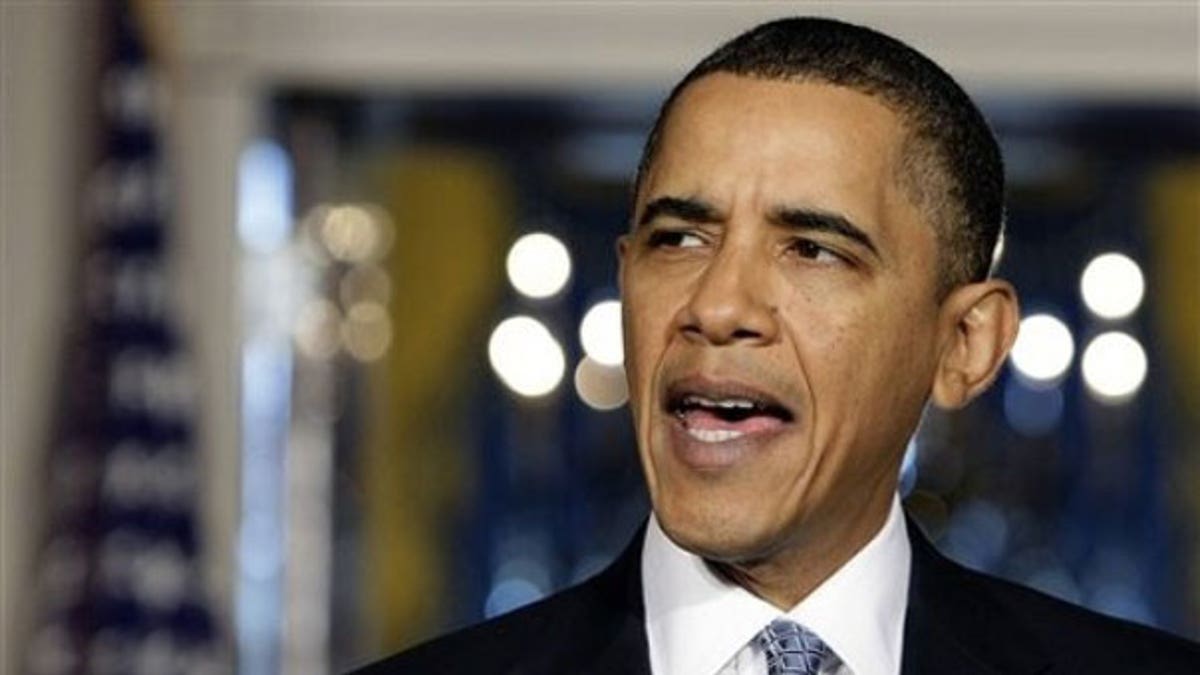
Feb. 1: President Obama makes a statement in the Grand Foyer of the White House in Washington on the budget he submitted to Congress (AP). (AP)
WASHINGTON -- President Obama will announce details of a new $30 billion small business lending initiative at a town hall meeting on jobs and the economy in New Hampshire today.
The initiative, called the Small Business Lending Fund, is targeted at 8,000 community banks with assets of less than $10 billion and, according to one financial industry source, could generate up to $240 billion to $300 billion in new small business loans, based on current government bank capital and leverage rules.
"These are the small, local banks that work most closely with our small businesses - that provide them their first loan, and watch them grow through good times and bad," the President will say in his opening remarks at the event in Nashua, NH, according to excerpts released by the White House.
The administration is counting on entrepreneurs and small company owners to help jumpstart job creation -- economists generally credit small businesses with creating about two-third of all new jobs-but many small firms need new capital to do it. Senior administration officials said they hope Congress will approve legislation for the new fund quickly; the measure could be included in a jobs package Senate Democratic leaders are assembling.
"This will help small banks do even more of what our economy needs -- ensure that small businesses are once again the engine of job growth in America," the President will tell New Hampshire voters, according to the excerpts.
Administration officials said the program would be financed with untapped spending authority in the $700 billion TARP bailout program and would be separate and distinct from TARP. The fund would provide new capital to smaller banks on a sliding cost scale -- the dividend rate on fund investments from the Treasury Department would be set at 5 percent initially, but decline to as low as 1 percent for banks that increase their small business lending by 10 percent or more.
"The more loans these banks provide to creditworthy small businesses, the better a deal we'll give them on capital from this fund," the President plans to say in Nashua.
The administration will ask Congress to exempt participating banks from tough TARP restrictions, including limits on executive compensation and dividend payments, as well as from requirements that TARP banks give stock warrants to the Treasury.
"We wanted something that would get the maximum participation," an Administration official said. Community banks that might be interested in government capital to help them land more to small companies "were hesitant to take it--not only out of fear of the TARP restrictions," he said, but because of the stigma of TARP - many healthier banks worry that taking TARP funds could wrongly signal a bank is weak or failing -- and the potential for retroactive legislation curbing TARP banks further.
While some community banks have taken TARP funds, the official said that the Treasury received applications for TARP investments from 600 smaller banks that decided to back out of the program over such concerns.
"We realized that to have the strongest possible effect on small business lending…we needed to create a new program," the official said.
In his State of the Union Address last week, the President announced his intention to divert $30 billion of TARP funds for small business lending but had not provided details of his plan.
If approved, the program would supplement other administration initiatives to jumpstart small business lending. It has declined because of tougher loan standards adopted by banks as a result of the financial crisis; capital reserving by banks worried about future losses on loans of all kinds; falling values of real estate and other assets small companies use for loan collateral, and tighter liquidity in small business financing markets in general. Among other things, Congress last year approved measures to boost loans to small companies through the Small Business Administration.
But another reason for the drop in small business lending, Administration officials acknowledged, is that many small business owners worry about taking in debt in a weak economy.
"Many (banks) absolutely mentioned that demand was the big issue," one official said. "But many also said that they were being conservative--that based on looking at the past 12 months, looking at the losses they'd taken, that of course…(they) are pulling back on whole categories of lending…That means that a lot of credit-worthy small business are going to left on the sidelines" without additional bank capital, he said.
Community bankers welcomed the initiative.
"Every dollar of capital that goes into a community bank can potentially be leveraged eight to ten times into loans to small businesses," said Camden Fine, president and CEO of Independent Community Bankers of America. "ICBA will work closely with both Congress and the administration on these and other initiatives that can benefit community banks and Main Street America."




